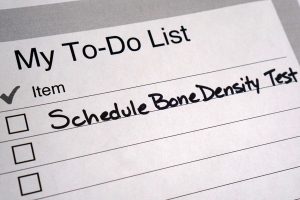
What makes strong bones so important? They give your body structure and protect your organs. They also help you move and stay balanced. When they are weak and porous, they have limited ability to carry out these tasks and become susceptible to breaks.
Unfortunately, bone mass peaks in the late 20s and bones naturally lose strength and density with each passing year. Without action, bones can be quite weak in advanced age.
Maintaining high bone mineral density is important for reducing the risk of age-related bone disorders like osteoporosis, which occurs when bones become weak, brittle, and prone to breaks.
The best ways to strengthen your bones are weight training (resistance exercise) and a nutrient-dense diet.
Weight-bearing exercise, using body weight, bands, kettlebells, dumbbells, or barbells, contributes to new bone growth and helps maintain existing bone structure.
But exercise can’t do it alone. It needs nutrients to help build good bone. Eating foods rich in vitamin C, calcium, phosphorus, vitamin K, and protein is also required for optimal bone health. Vitamin D is an essential component of strong bones, too.
Vitamin C is available in a host of fruits and vegetables and plays a key role in developing collagen to help keep bones stable and strong.
Calcium is found in most dairy products, broccoli, and is widely available in supplemental form. Avoid megadosing if you use supplements to top off your daily recommended intake. Megadosing calcium may pose risks to your health, including your heart.
Your bones are largely made of calcium, and when combined with phosphorus, it creates bone strength and density.
Fat-soluble vitamins D and K also help build bone. Vitamin K is available in leafy greens, and vitamin D mainly comes from sun exposure or supplementation.
Lastly, a high protein diet helps build bone and important muscle to protect it.
Keeping your bones strong with age can help you stay independent and mobile.